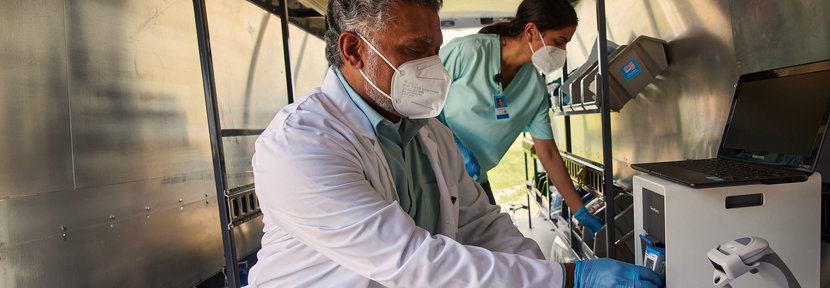Vidéo : 3 min
20 novembre 2024
TENDANCES EN MATIÈRE DE TECHNOLOGIES ET DE MALADIES
Vidéo
What is PCR? Understanding the Magic
Find out why PCR has become the standard for quality diagnostic testing. Cepheid's Dr. Tenover breaks it down for us.
Hello, my name is Dr. Fred Tenover, and I am the Vice President for Scientific Affairs at Cepheid, a molecular diagnostics company.
Let's talk a little bit about diagnostic tests in the clinical laboratory. Diagnostic tests play a critical role in virtually all aspects of patient management, from the initial diagnosis to antibiotic or antiviral selection for infections to infection prevention decisions. COVID-19 has certainly illustrated the key role that the Polymerase Chain Reaction (also known as PCR) plays in the diagnosis and management of patients who present with respiratory symptoms. But PCR is also used to aid in the diagnosis of many diseases, including sepsis, tuberculosis, sexually transmitted infections, and healthcare-associated infections.
But what is PCR? Simply put, it's the magic in the laboratory. Let's say you lost your car keys. Since you only have one copy of the keys, they could be anywhere and thus pretty tricky to find. But what if you could make ten thousand or even a hundred thousand copies of your car keys appear? That makes finding the keys very easy. How did I do that? It's magic. When it comes to finding the presence of an infection in a patient, the magic is PCR.
PCR is an enzymatic process that makes literally millions of copies of small segments of DNA or RNA that are unique to the microorganisms causing disease. Every microorganism has a signature nucleic acid sequence, so PCR allows us to detect an infectious agent directly in a clinical specimen much faster than traditional diagnostic methods, whether it's SARS-CoV-2, tuberculosis, gonorrhea, or even the viruses that cause hospital outbreaks of diarrheal disease like norovirus. And we can often do this in one hour or less using PCR.
Just as all hospitals do not offer the same quality of care, neither are all PCR testing solutions of equal quality. Some are faster, some are more sensitive, others are more specific. Some are much easier to use, and some, like those available on Cepheid's GeneXpert system, combine all of those attributes. The tests have well-documented high sensitivity and specificity, and the technology can be used just as easily at the point of care, like in urgent care clinics or physician office laboratories, as they are in the hospital or large reference laboratories because it is all the same cartridge for every location.
When it comes to diagnostic tests, especially PCR, we need to be concerned about several major issues. The first is the accuracy of the test, that is, the sensitivity and specificity. Sensitivity refers to the ability of the test to identify all the patients who have the disease. Specificity, on the other hand, refers to the ability of a test to be negative in all those patients who do not have that disease. You do not want to mistakenly tell a patient that they have an infection when they don't. For example, high sensitivity means you accurately detect all those patients who come to your hospital and who have COVID-19 due to SARS-CoV-2, while the high specificity of the test means that those patients with other respiratory tract infections will be negative.
Taken together, sensitivity and specificity describe the accuracy of the PCR test. Now, there are two other attributes of a PCR test that merit your consideration: speed and simplicity. The flexibility of the GeneXpert system enables anywhere from 1 to 80 cartridges being processed simultaneously, and with 22 FDA-approved, cleared, or authorized tests, you can consolidate a lot of PCR testing on a single instrument.
Once again, the magic that enables the diagnosis is PCR, and with Cepheid, it's PCR Plus. Thank you for your time.
IVD. In Vitro Diagnostic Medical Device. Peut ne pas être disponible dans tous les pays.
Lire la suite
PLUS








